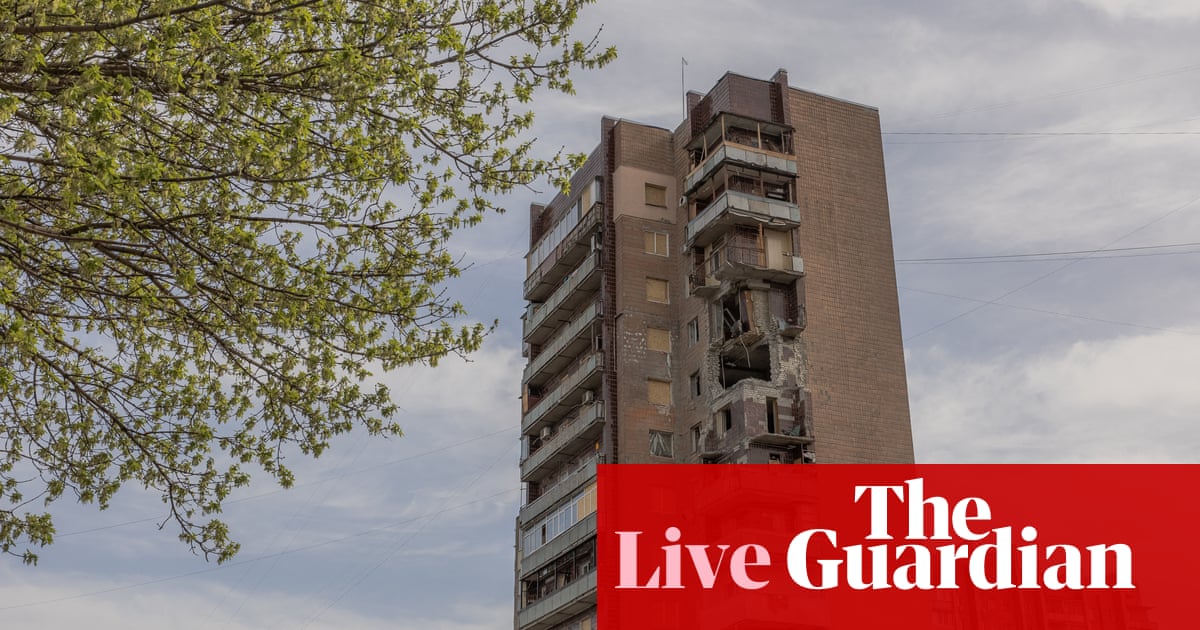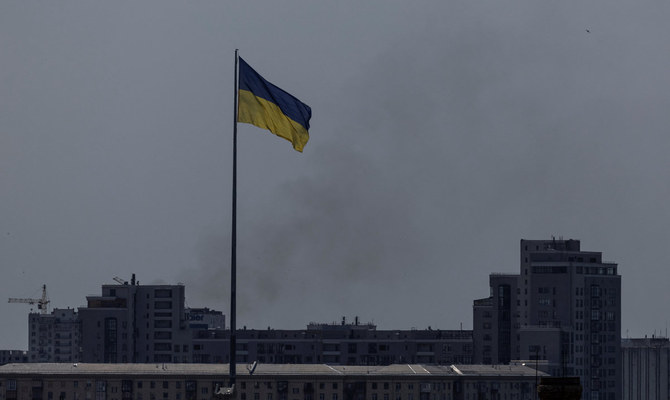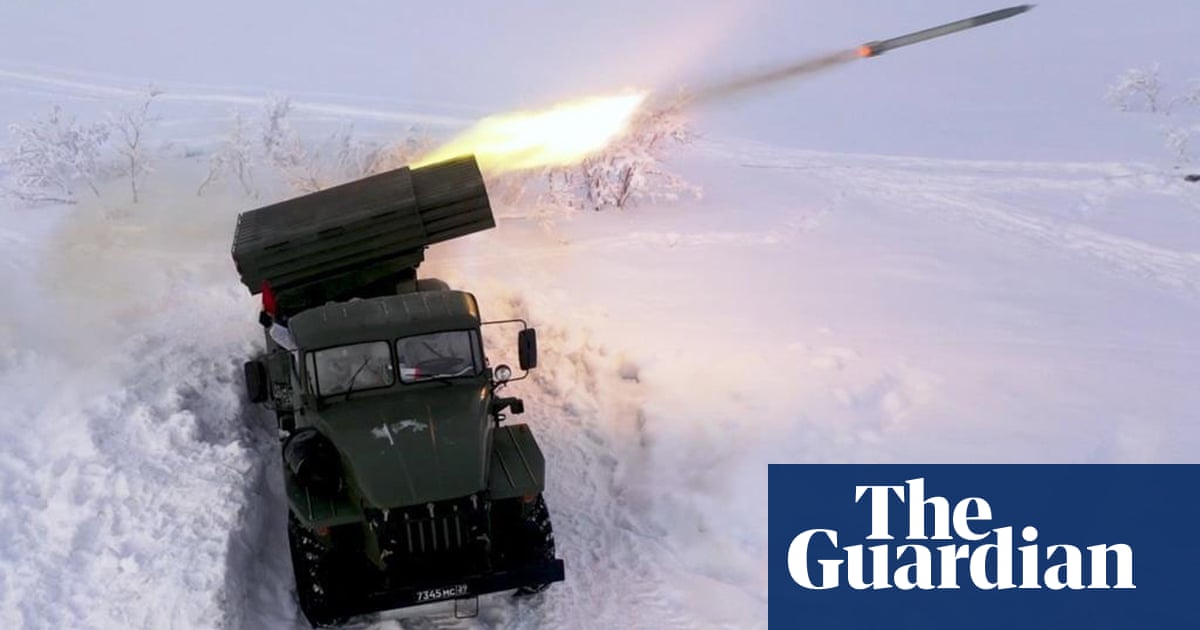
Putin orders Russia"s nuclear deterrence forces on high alert, US attacks "unacceptable" escalation
Russian president Vladimir Putin has ordered his military to put the country’s nuclear deterrence forces on high alert in response to “aggressive statements” by Nato countries.
The order, which was announced by the state-run Tass news agency, came at a meeting between Putin, defence minister Sergei Shoigu and chief of the general staff of the armed forces of Russia, Valery Gerasimov.
“Senior officials of the leading Nato countries also allow aggressive statements against our country, therefore I order the Minister of Defense and the Chief of the General Staff [of the Russian Armed Forces] to transfer the deterrence forces of the Russian army to a special mode of combat duty,” Putin said in the statement.
It is not immediately clear what the “special mode of combat duty” entailed. Putin has warned foreign countries not to interfere in his ongoing invasion of Ukraine, saying it could lead to “consequences they have never seen”. He has positioned anti-air missiles and other advanced missile systems in Belarus and deployed his fleet to the Black Sea in an effort to prevent a western intervention in Ukraine.
The Russian invasion has left hundreds dead. Russia has launched missile strikes against buildings in Kyiv, Kharkiv and other major Ukrainian cities as it threatens an all-out assault not seen since the time of the second world war.
The US responded that this was an “unacceptable” escalation, US ambassador to the United Nations Linda Thomas-Greenfield said on Sunday.
“It means that President Putin is continuing to escalate this war in a manner that is totally unacceptable and we have to continue to stem his actions in the strongest possible way,” Thomas-Greenfield said in interview with CBS’ Face the Nation.
The United Nations security council has called for an emergency special session of the general assembly in response to Russia’s invasion of Ukraine, marking the first time in 40 years the council has made such a request.
Russia voted against the resolution while China, India and the United Arab Emirates abstained from voting. The emergency meeting will be held on Monday.
“This is not an ordinary moment. We need to take extraordinary action to meet this threat to our international system and to do everything we can to help Ukraine and its people,” said Linda Thomas-Greenfield, the US ambassador to the UN, according to the New York Times.
Fifa has decided that Russia can continue their bid to qualify for this winter’s World Cup, despite their opponents refusing to play against them. As England became the latest country to say they will boycott matches against Russia following the invasion of Ukraine, Fifa finally ended days of silence on the subject only to effectively endorse the status quo.
Under a series of “initial measures” agreed by the Fifa council on Sunday, next month’s World Cup play-off between Russia and Poland will go ahead but at a neutral venue and with no spectators. Russia will also be forced to go by the name “Football Union of Russia (RFU)” in an echo of the punishment imposed on the country at the Olympics. No Russian flag will be flown either, nor will the anthem be played.
In a statement Fifa said they would be willing to consider further actions, including expulsion from the World Cup, should “the situation not be improving rapidly”. They said they had already “been in dialogue” with the Polish FA about the match, having “taken good note of the positions expressed via social media”.
But Fifa’s proposal was immediately rejected by the Polish football authorities, who earlier this weekend had declared their determination to boycott any fixture with Russia, a sentiment shared by individual players including star striker Robert Lewandowski. The president of the Polish FA, Cezary Kulesza, described Fifa’s decision as “unacceptable”.
Satellite images are showing a large convoy of Russian troops headed toward Kyiv.
A 3.25-mile long deployment of Russian forces, in a convoy with fuel, logistics and armoured vehicles, appears to be moving in the direction of Kyiv approximately 40 miles to the south.
No Russian troops are currently in the capital, the mayor Vitali Klitschko said, but nine civilians, 18 fighters and four unidentified persons have been killed in Kyiv since fighting began on 24 February.
Boris Johnson: "No hostility in my part towards the Russian people"
Boris Johnson visited a Ukrainian church in London on Sunday where he offered support to the people of Ukraine.
“I want to stress that there is no hostility in my part towards the Russian people. None whatever, quite the reverse,” the British prime minister said in an address at the Ukrainian Catholic Cathedral.
“My heart aches for the Russian parents who are already losing their children in this vicious and appalling war, just as it aches for the civilians and the people of Ukraine. But when it comes to the Russian leadership that chose this path of violence, and I stress chose, this path of violence and aggression, there can be no possible excuse.
“Never in all my study, my memory of politics and international affairs have I seen so clear a distinction between right and wrong, between good and evil, between light and dark. And that is the real reason why Ukraine is our neighbour today.
“And by the way I say to all the countries around the world who may only just be waking up to the horror of what is going on – I say to everybody around the world, that is why Ukraine should be your neighbour too.”
Kyiv mayor: reports capital surrounded by Russian forces are false
The mayor of Kyiv has said reports that the capital is surrounded by Russian forces are false.
“In the evening, Russian online publications spread information with reference to me that Kyiv was allegedly surrounded and evacuation of people was impossible,” Vitali Klitschko said in a statement. “And it is strange that Ukrainian telegram channels started to spread it… Do not believe lies! Trust information only from official sources. Together, we will stand together. Ukraine will win!”
A spokesperson for the mayor told the Kyiv Independent that Klitschko misspoke earlier Sunday, and that information about Russian troops encircling the city is “a lie and a manipulation”.
Satellite images on Sunday showed a 3.25-mile long deployment of Russian forces advancing toward Kyiv.
Volodymyr Zelenskiy says the Ukrainian and Russian delegations will meet without preconditions at Pripyat in Belarus.
The Ukrainian president said he was not confident that any progress would be made, but that he would try.
“I’ll say frankly, like always, that I don’t believe in the result of this meeting,” he said. “But let’s try, so that no citizen of Ukraine would have any doubt that I, as president, tried to stop the war when there was even a chance.”
The US state department is advising American citizens to consider leaving Russia immediately.
“An increasing number of airlines are cancelling flights into and out of Russia, and numerous countries have closed their airspace to Russian airlines. US citizens should consider departing Russia immediately via commercial options still available,” the department said on Sunday.
Last month, the US warned Americans against traveling to Russia because of tension along the border with Ukraine as well as “the potential for harassment against US citizens, the embassy’s limited ability to assist US citizens in Russia” and “harassment by Russian government security officials”.
The UK will send an additional £40m in humanitarian aid to Ukraine, Boris Johnson announced Sunday.
The funding will help aid agencies and provide access to medical supplies such as medicines, syringes, dressings and wound care packs, and other basic necessities.
“In the last days the world has witnessed awe-inspiring displays of bravery and heroism from the Ukrainian people in response to those who seek to obliterate their freedom by force,” the British prime minister said. “The UK will not turn our backs in Ukraine’s hour of need. We are providing all the economic and military support we can to help those Ukrainians risking everything to protect their country.”
The government has pledged £140m in aid to Ukraine this year, and offered to guarantee up to $500m of loans. The UK, along with multiple other European countries, has pledged to continue to supply arms to Ukraine’s military as it battles invading Russian forces.
Johnson, who met with Ukrainian community leaders at a London church on Sunday, said any Ukrainian person settled in the UK will be able to bring immediate family members from Ukraine.
Multiple European countries are offering weapons to Ukraine as it battles Russia’s invasion.
Sweden announced Sunday it would give military aid, including anti-tank weapons, helmets and body armor, to Ukraine, the first time it has sent weapons to a country in armed conflict since the Soviet Union’s 1939 invasion of Finland, said Magdalena Andersson, the prime minister.
“Sweden is now proposing direct support for Ukraine’s armed forces. It includes 135,000 field rations, 5,000 helmets, 5,000 body shields and 5,000 anti-tank weapons,” Andersson said.
Belgium plans to send thousands of machine guns and hundreds of anti-tank grenade launchers, Volodymyr Zelenskiy, the Ukrainian president, said Sunday.
Meanwhile, Germany announced yesterday it would send anti-tank weapons and missiles to Ukraine, a major reversal of its policy of not exporting arms to conflict zones.
Norway’s sovereign wealth fund will divest its Russian assets in response to Russia’s invasion of Ukraine, the Norwegian prime minister announced on Sunday.
The $1.3tn sovereign wealth fund is the world’s largest. Its Russian assets, which include government bonds and shares in nearly 50 companies, were worth $2.83bn at the end of 2021.
“We have decided to freeze the fund’s investments and have begun a process of selling out [of Russia],” Jonas Gahr Støre, the prime minister, said at a news conference.
The Biden administration on Sunday condemned Vladimir Putin’s order placing Russia’s nuclear deterrence forces on high alert as the US president faces growing calls from senior Republicans to issue a new round of sanctions targeting Russia’s energy sector.
Speaking on ABC News on Sunday Jen Psaki, the White House press secretary, described Russia’s nuclear deterrence announcement as an example of Putin “manufacturing threats that don’t exist in order to justify further aggression”.
In televised comments Putin said he had ordered “the deterrence forces of the Russian army to a special mode of combat duty” due to “aggressive statements” from Nato leaders. Analysts told the Guardian that while the order itself was not immediately clear, it was not indicative of preparation for a first strike.
In response, Psaki said: “At no point has Russia been under threat from Nato, has Russia been under threat from Ukraine, this is all a pattern from President Putin. And we’re going to stand up for it. We have the ability to defend ourselves, but we also need to call out what we’re seeing here from President Putin.”
The US ambassador to the United Nations, Linda Thomas-Greenfield, described the order as indicative of Putin “continuing to escalate this war in a manner that is totally unacceptable”. She added in an interview with CBS News: “We have to continue to condemn his actions in ... the strongest possible way.”
On Sunday a number of senior Republicans, including Senator Tom Cotton, a foreign policy hawk, continued to urge Biden to issue a new round of sanctions targeting Russia’s oil and gas exports.
“It’s time for the president and some of our European partners to quit pussy-footing around. The financial sanctions announced last night are riddled with loopholes,” he told ABC News.
The administration has already alluded to further sanctions as the war continues.
EU to purchase weapons for Ukraine
The European Union will purchase weapons for Ukraine as it fights against Russia’s invasion, officials said Sunday.
“For the first time ever, the European Union will finance the purchase and delivery of weapons and other equipment to a country that is under attack, Ursula von der Leyen, the European Commission president, said.
A commission source told Reuters it planned to spend €450m in EU funds on weapons for Ukraine, and an additional €50m on other items including medical supplies.
The EU also plans to close its airspace to Russian aircraft, including the private jets of Russian oligarchs, von der Leyen said.
Vitali Klitschko, Kyiv’s mayor and former world heavyweight boxing champion, has described the Ukraine capital as “encircled” and said a civilian evacuation would not be possible “because all ways are blocked”.
“We are at the border of a humanitarian catastrophe,” he told Associated Press on Sunday as a curfew continued in the city which he said allowed authorities to hunt “saboteurs” on the streets. “Right now, we have electricity, right now we have water and heating in our houses. But the infrastructure is destroyed to deliver the food and medication.”
“That’s why the message for everyone is: support Ukraine together ... We are strong,” he said. “Every Ukrainian is proud to be independent, proud to be Ukrainian, and we are proud to have our own country.”
The European Union has announced it will ban Russian-state backed television channels RT and Sputnik in an unprecedented move against the Kremlin media machine.
The European Commission president, Ursula von der Leyen, said: “Russia Today and Sputnik, as well as their subsidiaries, will no longer be able to spread their lies to justify Putin’s war and to sow division in our union. So we are developing tools to ban their toxic and harmful disinformation in Europe.”
The move, which was neither trailed nor widely discussed, came as part of a package of tougher sanctions against Vladimir Putin’s government and the regime of Belarusian president Alexander Lukashenko, which Von der Leyen described as “complicit in this vicious attack against Ukraine”.
The UK’s culture secretary, Nadine Dorries, last week wrote to the UK broadcasting regulator Ofcom asking it to look at whether RT should be allowed to broadcast “harmful disinformation” in the UK. Some argued against a ban, warning that it could lead to Moscow closing down the BBC in Russia.
As British business face pressure to untangle themselves from Russian links after the invasion of Ukraine, one of Britain’s biggest companies, BP, said on Sunday it had decided to exit its 19.75 % stake in Russian oil giant Rosneft. It is a significant move that could cost the company up to $25bn, according to figures in its own statement.
BP chief executive Bernard Looney, who will step down from the Rosneft board with Bob Dudley, former chief executive, said the invasion “caused us to fundamentally rethink BP’s position with Rosneft.” He said he had been “deeply shocked and saddened” by the situation. BP has owned almost a fifth of the oil giant since 2013 and it accounted for half of the oil reserves that BP had in the ground, the Guardian understands.
BP’s chair, Helge Lund, said: “Russia’s attack on Ukraine is an act of aggression which is having tragic consequences across the region. BP has operated in Russia for over 30 years, working with brilliant Russian colleagues. However, this military action represents a fundamental change.”
Peaceful anti-war protests have been happening around the world, with perhaps the largest happening in Berlin with over 100,000 participants, my colleague in the German capital, Kate Connolly reports.
“Stop War, Stop Putin” was the slogan displayed on many banners, with others asking: “Why not simply peace?” The demonstrators were scheduled to gather on the wide 17 Juni boulevard between the Brandenburg Gate and the Victory Column in Berlin’s city centre, but authorities were forced to expand the designated area to neighbouring streets in order to ensure that coronavirus restrictions could be observed. Trade unionists, churchgoers, environmental activists, peace groups as well as unaffiliated individuals gathered.
Frank Werneke, head of the large trade union Verdi, said the demonstration was an important signal of solidarity with the people of Ukraine, in light of the dramatic scenes unfolding there. He said the demonstration was against Putin, not Russia: “It’s important to state that Putin is not Russia.”
Elsewhere Reuters and PA reported:
In Prague around 80,000 protesters thronged the central square, with the Czech prime minister telling the crowd the country still remembered its own terror of Russian tanks rolling into the capital more than five decades ago.
In Madrid, thousands of protesters waved Ukrainian flags. They held signs reading “Peace”, “Stop Putin”, and “Putin, you should be scared – my grandmother is really angry”.
In London thousands of demonstrators gathered in Trafalgar Square, and many Russians joined the rally, led by Ukrainian community leaders, holding up placards with messages like “Russians do not want the war”. Several described the “very close” ties between the two countries, calling Ukrainians “brothers and sisters” and “best friends”.
In Denmark, roughly 400 demonstrators gathered in front of the Ukrainian embassy in central Copenhagen, where many participants lit candles and laid flowers to show their support for the Ukrainian people.
Reuters is quoting Ukraine’s president Volodymyr Zelenskiy saying he will use every opportunity to secure peace, ahead of talks planned between Russian and Ukrainian representatives close to the Belarus border.
“I do not really believe in the outcome of this meeting, but let them try so that later not a single citizen of Ukraine has any doubt that I, as President, tried to stop the war, when there was even a small, but still a chance,” Zelenskiy said.












